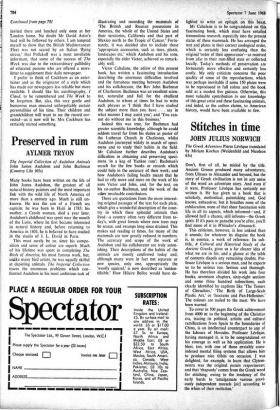Seamy stories
DONALD McLACHLAN
Patricia Cockburn—rose-grower and horse- breeder, in her youth a daring traveller and on occasion editor of The Week—may one day, as a devoted wife, regret writing this book. It may well prove to be the beginning of the end of the myth which has coloured so many accounts of the 'thirties. Until now it has been hard to get hold of copies of that diabolical, little cyclostyled news-sheet which, in Cyril Connolly's phrase, 'never put anything past its opponents' and equated rumour with fact. Now copious extracts are offered for the atten- tion of postgraduate historians and experts in `communication.' I fear that the former will check the stories about the Cliveden set with the Cliveden visitors' book and that the latter will solemnly analyse the sentence structure and sinuosities of a Cockburn paragraph.
Personally I regret this. I liked the myth as it was, having followed in Cockburn's footsteps both as a Laming Fellow of Queen's, Oxford, and as a correspondent of The Times; but if people like Philip Toynbee insist on applying to him such hyperbole as 'patron saint of the 'thirties,' the temptation to analyse and contra- dict is overwhelming. One finds that the style of The Week is a parody of what the diplo- matic correspondence of the 'heavies' used to be, that its secret is an elegant trick, designed to make it impossible for the ordinary reader to distinguish assertion from speculation. Take, for instance, the reporting of an epi- sode which I remember well, the burning of the Reichstag in 1933. Cockburn—he wrote 80 per cent of The Week's copy himself— alleges that the fire was intended to force a breach between the Germans and the Soviet Union and so remove from the German market the active competition of Derop, the Russian oil agency. He calls his story 'sensational but well vouched for'; the source is 'exceedingly well posted and cautious.' How far these oil interests, acting in concert with certain ele- ments in the Nazi Government, actually helped to plan the fire is unknown.' But 'certain it is that persons previously connected with those oil interests were connected with the planning of the fire and that within an hour or two of the outbreak a lightning raid was made on the office of Derop.' Note the skilful balancing of assertion and qualification, the memorable allegation followed by the for- gettable negative. I am reminded of Cockburn's story, once submitted to me for publication, of how a gale of unprecedented ferocity blew a salmon through the half-open window of a train standing in—I think—Youghal station.
Already the business of refuting The Week. has begun. The Observer magazine inserted towards the end of a digest of Mrs Cock- burn's book a brief section on the Astor family. They belonged, it says, to the liberal-inter- nationalist wing of the Conservative party; they believed in peaceful co-existence between' different types of country; Nancy Astor was particularly interested in relations with the, Soviet Union and Maisky and Litvinov were welcomed at Cliveden. Ribbcntrop was never
Continued on page 784 Continued from page 981
invited there and lunched only once at her London home. No doubt Mr David Astor's lead will be followed by others. I am tempted myself to show that the British Mediterranean Fleet was not scared by an Italian 'flying circus,' that Pollakoff was a most unreliable informant, that some of the success of The Week was due to the extraordinary gullibility of educated persons who are offered a news- letter to supplement their daily newspaper.
I prefer to think of Cockburn as an enter- tainer and as the originator of a style which has made our newspapers less reliable but more readable. I should like his autobiography, 1 Claud, to be remembered and The Week to be forgotten. But, alas, this very gentle and humorous man smeared unforgettably certain personalities of his time. Their children and grandchildren will want to see the record cor- rected—as it now will be. Mrs Cockburn has certainly started something.







































 Previous page
Previous page